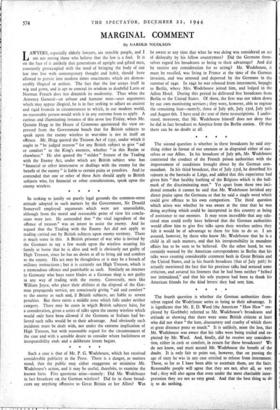In seeking to justify on purely legal grounds the common-sense
attitude adopted in such matters by the Government, Sir Donald Somervell employed arguments which were not unassailable, although from the moral and reasonable point of view his conclu- sions were just. He contended that " the vital ingredient of the offence of treason" was an intent to assist the enemy. And he argued that the Trading with the Enemy Act did not apply to trading carried out by British subjects upon enemy territory. There is much sense in this. A British prisoner of war who is invited by the Germans to say a few words upon the wireless assuring his family at home that he is alive and well is obviously not guilty of High Treason, since he has no desire at all to bring aid and comfort to the enemy. His act may be thoughtless or it may be a breach of military instructions ; but it is certainly not High Treason, which is a tremendous offence and punishable as such. Similarly an internee in Germany who buys razor blades at a German shop is not guilty in any way of trading with the enemy. Conversely, men like William Joyce, who place their abilities at the disposal of the Ger- man propaganda service, are consciously giving " aid and comfort" to the enemy as such and, if British subjects, are liable to severe penalties. But there exists a middle zone which falls under neither category. There may be cases in wliich British subjects have, for a consideration, given a series of talks upon the enemy wireless which would only have been allowed if the Germans or Italians had be- lieved such talks would be to their advantage. And obviously such incidents must be dealt with, not under the extreme implication of High Treason, but with reasonable regard for the circumstances of the case and with a sensible desire to consider where foolishness or irresponsibility ends and a deliberate intent begins.


























 Previous page
Previous page